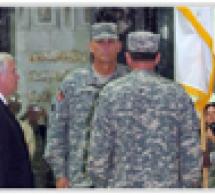 |
 |
Challenges That Face Iraq's New Command
On Tuesday of this week, command of the Multi-National Force-Iraq (MNF-I) was transferred from General David Petraeus to General Ray Odierno. Just as the baton was passed from commander to commander in Iraq, in a few months, the baton will also be passed from one President to another. As these transitions take place, there are still many delicate issues ahead. Kimberly Kagan's newest co-authored editorial addresses those issues. Written in conjunction with retired General Jack Keane and AEI scholar Frederick Kagan, the editorial, entitled The Endgame in Iraq, appears in the latest edition of The Weekly Standard. The editorial looks at the challenges that face both General Odierno and the next administration in regards to Iraq policies.
A primary issue going forward will be troop levels. It is clear that combat brigades that entered Iraq as part of the surge have enabled economic and political developments in the country. Yet, despite the progress made over the last 18 months, enemy elements in Iraq have not been completely eliminated, and sectarian violence that was commonplace before the troop surge could reappear as Iraq approaches its next election. Just as it is important for the current U.S. administration to leave an Iraq headed in the right direction, it will be equally important for the next president to continue with the progress that is being made. To learn more, be sure to read the entire editorial.
